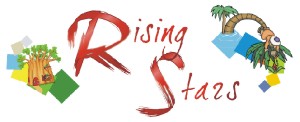Harry
Potter and the moons of Jupiter
By Synergie
Blistering-hot
volcanoes that belch snow. Moons bigger than planets. Icy worlds with
vast underground oceans. All of these things can be found in the latest
Harry Potter novel. And according to NASA space probes, they're all
real.
It was late one
night at Hogwarts when Harry, Ron and Hermione were doing their homework:
"a long and difficult essay about Jupiter's moons," but
Harry and Ron didn't have their facts straight. "Harry, you must
have misheard Professor Sinistra," says Hermione on page 300
of Harry Potter and the Order of the Phoenix. "Europa's covered
in ice, not mice!"
Correct. Jupiter's
moon Europa is way too cold for mice: 260° F below zero. Spacecraft
have taken pictures of Europa's icy surface, and it looks totally
lifeless. Underground, however, might be a different matter. Some
scientists think the ice on Europa hides the biggest ocean in the
solar system--bigger than the Pacific, Atlantic and Indian oceans
combined. Here on Earth water and life seem to go together. Could
there be life in the waters of Europa? Microbes? Alien fish? Swimming
mice? No one knows--not even Hermione.
"And it's
Io that's got the volcanoes," she says on page 295, correcting
Ron's essay.
Right again. Io
is even weirder than Europa. Some people say Io, dotted with volcanoes,
looks like a pepperoni pizza, and that's about right. Io has more
pepperoni-colored volcanoes than Ron Weasley has freckles. At any
given moment, dozens of them might be active, spewing the hottest
lava in the solar system. The plumes rise 300 miles into space where
it's so cold that volcanic ash freezes before it falls back to the
ground--sulfurous snow. NASA's Galileo spacecraft has actually flown
through some of these plumes and survived.
"Jupiter's
biggest moon is Ganymede, not Callisto," Hermione adds, pointing
over Ron's shoulder at another mistake.
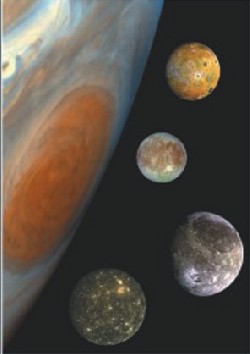
Indeed, Ganymede
is the largest moon in the whole solar system. It's slightly wider
than the planet Mercury and more than three-quarters the size of the
planet Mars. If it orbited the sun instead of Jupiter, Ganymede would
surely be considered a planet. Heavily cratered Callisto is only a
little smaller than Ganymede and, like Europa, might be hiding a subterranean
ocean.
These four wonderful
moons, Io, Europa, Ganymede and Callisto are real. They were discovered
by Galileo Galilei in 1610 when he looked at Jupiter through one of
the first primitive telescopes. Galileo was amazed by the four little
stars he saw near the giant planet, and even more amazed when they
moved from night to night, orbiting Jupiter. Astronomers now call
them the Galilean satellites.
The reason for all this extravagance was… this week you can see the
Galilean satellites for yourself! Step outside around 9 p.m. and look
west toward the setting sun. The first bright star emerging from the
twilight is Jupiter. Point a telescope in that direction; a small
one will do. (Remember, even the cheapest toy-shop telescope is better
than Galileo's 400 year-old spyglass.) The four moons will appear
in the eyepiece as a line of dim stars straddling the giant planet.
If you don't have a telescope but don't want to miss out on any possible
magic spell either, head towards the Science museum at Agargao with
some potato chips and a coke. They have a wonderful planetarium and
also a telescope, which is open for visitors after 7 pm (if the weather
and dark spirits permit).
If
you only see two or three moons, that's because one or two of them
are probably behind Jupiter. Look again later or perhaps tomorrow.
The missing moons will come out of hiding as they circle Jupiter.
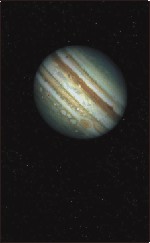
Jupiter itself
will look like a fat disk crossed by rust-colored cloud belts. First-time
observers often note that the planet seems squashed--wider along the
equator than between the poles. Is there something wrong with the
telescope? No. Jupiter really is flattened. Although Jupiter is 11
times bigger around the middle than Earth, it spins more than twice
as fast; a day on Jupiter lasts only 9 hours and 55 minutes. This
rapid spin is what gives Jupiter its equatorial bulge.
Young wizards
are advised not to wait too long to see these things because Jupiter
and its moons will soon disapparate! Or as a muggle astronomer would
say, they're about to disappear for a few months behind the sun. In
fact, this week is your last chance to see the moons of Jupiter before
school starts again in the fall.
So don't miss them. You do want to pass your O.W.L.s ... don't you?
Matt
Le Blanc
As an educated
carpenter, model, and actor, Matt LeBlanc has a smarter head on his
shoulders than his "Friends" counterpart, Joey, is reputed
for.
Entertainment
Weekly once lauded Matt LeBlanc as "a rarity - a hunk with a
gift for deadpan comedy," for his role as one of America's favorite
"Friends." However, LeBlanc might never have detoured to
acting if his mother, fearing for his safety, had not encouraged him
to pursue something other than professional motorcycle racing.
After
receiving his first motorcycle at age 8, LeBlanc participated in various
amateur races and later, even trained for a career in carpentry before
ultimately deciding to become an actor.
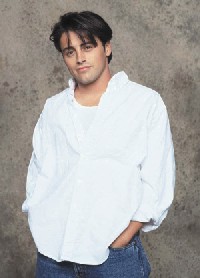
After graduating
from high school, LeBlanc set his sights on living in New York City.
By 1987, he had obtained parts in national television commercials
for such high-profile products as Levi's 501 jeans, Coca-Cola and
Doritos. He also appeared in a Heinz ketchup spot that won the prestigious
Gold Lion Award at the 1987 Cannes Film Festival.
In 1988, LeBlanc
began formal acting training. Within a year, he landed a starring
role on the television series "TV 101" and relocated to
Los Angeles. Since then, his television credits include starring roles
on "Top of the Heap" and "Vinnie & Bobby"
which were spin-offs of "Married With...Children". He also
starred in the TV movie "Anything to Survive", opposite
Robert Conrad. But he struck gold when he was cast in the mega hit
TV series "Friends".
and
in the movie "Anything to Survive"). He also guest-starred
on "Class of '96.
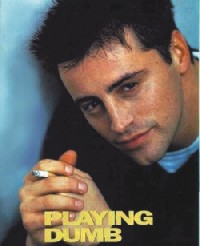
LeBlanc most recently
appeared on the big screen in the 2000 blockbuster "Charlie's
Angels," an update of the 1970s television series opposite Drew
Barrymore, Cameron Diaz and Lucy Liu. His other feature-film credits
include starring roles in "Lost in Space" and "Ed."
LeBlanc can be seen alongside Eddie Izzard in the upcoming war comedy
"All the Queen's Men."
LeBlanc was recently
honored for his contribution to the world of entertainment by the
National Italian-American Foundation in Washington, D.C.
In addition to
acting, LeBlanc enjoys working on his own cars and motorcycles --
which include a Pantera race car -- and playing with his dogs and
landscape photography. He currently lives in Los Angeles earning one
million per episode of "Friends". His date of birth is May
25, 1968 .
Joey Tribbiani
in a spinoff series after "Friends" signs off
LOS ANGELES, July
21 - "Friends" will enter its 10th and presumed final season
on NBC this fall. Let's hope not. So is this the one where Joey gets
his really big break? Maybe so. There are talks among NBC, Warner
Bros. TV and Matt LeBlanc to cut a deal for a "Friends"
spinoff sitcom revolving around LeBlanc's Joey Tribbiani character.
Insiders stressed
that no deals are in place for the spinoff, but it's understood that
the principals have stepped up the negotiations in an effort to secure
a commitment with LeBlanc in the near future.
Those players also have settled on veteran "Friends" writers
and executive producers Scott Silveri and Shana Goldberg-Meehan to
pen the pilot script should a deal be hammered out.
LeBlanc's character
of the oddball soap opera actor has, of course, been at the center
of "Friends" during the past two seasons as the love triangle
played out among Joey, David Schwimmer's Ross and Jennifer Aniston's
Rachel characters. Yes, that's a little inside scoop for those of
us lowly Bangladeshis who are still going through ancient reruns of
the ancient seasons.
LeBlanc
earns about a million per episode so you can guess his bargaining
power certainly wasn't hurt by the fact that the actor last week earned
his second consecutive Emmy nomination for his work on America's most-watched
comedy series.

PC GAME
REVIEW
Pirates of the Caribbean
Publisher:
Bethesda Softworks. Developer: Akella. Genre: Role-Playing. Gamespot
Score: 7.6. Requirements: 128 MB RAM, 8X CD-ROM, 32 MB VRAM, 1500
MB disk space, DirectX v8.1.
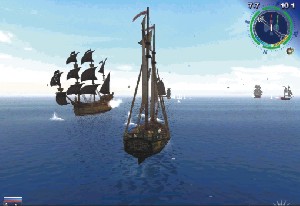
It's kind of like
17th-century Grand Theft Auto with galleons replacing the cars. In
Pirates of the Caribbean, it's the 17th century, and you're Nathaniel
Hawk, a sharp-witted captain of his own modest ship. He's trying to
make ends meet in the Caribbean, a collection of small islands ruled
over by European nations including the English, the French, the Spanish,
the Dutch, and more. The Caribbean archipelago is home to some good
weather and plenty of lucrative natural resources, which have made
it an obvious draw for the world's powers--as well as the perfect
place for pirates and privateers to set up shop. The game's story
begins when the French make a play for an English colony, and Hawk
barely escapes with his life. He ends up helping put the French back
in their place and then becomes embroiled in a greater plot, which
even has some supernatural overtones. The presence of some undead
pirates is apparently what ties this game in with its namesakes, but
other than the occasional encounters with the living dead, you'll
find that Pirates of the Caribbean pretty much plays it straight.
Pirates consists of a number of different gameplay elements. You navigate
between islands by controlling a tiny little ship as it crawls across
a map of the Caribbean. You'll see numerous other vessels materialize
as you sail across the waters, some of which may attack you, and any
of which you may choose to attack yourself. Sometimes you'll see ships
already engaged in battle and may crash the party if it pleases you.
You might also run headlong into a storm. Whenever these types of
events occur, the game switches to a third-person perspective of your
ship, which you can then manually control by raising and furling the
sails, trying to catch a good tailwind, arming and firing your cannons,
and even boarding nearby enemy vessels. An optional first-person view
lets you manually aim your weapons, though the third-person view is
usually preferable. You can also moor at the numerous island ports
or other dry-land locations of interest.
Once you've docked
or boarded an enemy vessel (or been boarded yourself), Pirates of
the Caribbean becomes a third-person action adventure game of sorts,
as you'll be controlling Hawk directly and can engage in some basic
combat using your saber and slow-loading pistol. Boarding is roughly
the same every time--in larger ships you'll go through several stages
of combat, but Hawk can always take a cheap shot against his foes
when the action first begins. When in town, Hawk can mill about and
speak with the locals, and visit key locations including the tavern,
the shop, the shipyard, and the town hall. A first-person perspective
is optionally available here as well, and though the on-foot regions
are relatively small, they're carefully detailed and make a good contrast
to the boundless stretches of ocean that you'll see while sailing.
The main storyline
has Hawk scurrying from island to island for various reasons, which
is a great opportunity to engage in the game's trade system. You have
access to a trade book that shows you which goods are imported from
and which goods are exported to each island, and you can proceed to
buy low and sell high. The bigger the ship you have (or the more ships
you have in your fleet), the more stuff you can lug and the more profit
you can earn.
Fortunately, commerce
is just one of several ways to earn money in the game. You're rewarded
well for solving the main story quests as well as for taking on occasional
random missions, which usually take the form of offers from wealthy
merchants for you to escort them to certain remote islands.
Hawk
gains a reputation, one way or another, over the course of the game.
Do good deeds and you'll be well liked by most of the European nations,
though maybe not by the pirates. Or, you can become a wicked pirate
yourself and strike fear into the hearts of wealthy merchants everywhere,
though you'd better be ready to face some powerful enemy European
fleets. As he gains levels, Hawk also becomes eligible to commandeer
larger and larger ships, so soon enough your crew of less than a hundred
may grow to many times that size if you can afford (or relieve an
enemy of) a better set of sails. In the bigger ships, especially if
you have fleets of them, you can even take on island fortresses in
some of the game's most challenging naval battles. The larger ships
can be less maneuverable than the smaller ones and can cost a fortune
to repair, but they are still hands-down superior to smaller vessels
for the most part. As such, it's quite satisfying to upgrade to a
larger ship class.
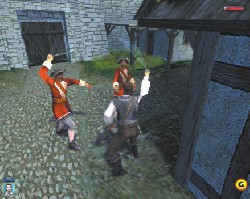
Naval combat is
slow-paced and relatively simple--just point your broadsides at the
opponent and commence firing, then maybe try to maneuver to an odd
angle as you reload, to prevent the enemy from returning fire as effectively.
You have a number of different ammo types at your disposal, including
good old cannonballs, grape shot that's perfect for killing enemy
crew, knippel for destroying sails and rigging, and bombs, which are
more expensive but more destructive than the other types. You may
also upgrade to different types of cannons, some of which have a longer
range at the expense of less power, or vice versa. There isn't so
much you can do to customize your ship besides that. You want to keep
your crew maxed out at all times and keep its morale high, which is
easily achieved just by paying everyone extra if their morale gets
low for some reason. Also, just as you can upgrade your ship's weapons,
so can you buy better swords and pistols for Hawk.
Pirates of the
Caribbean is an enjoyable game that's recommendable to those intrigued
by the subject matter. The big, dramatic-looking naval battles pack
in a lot of variety, and the open-ended structure of the campaign
rewards your curiosity. Too bad the shortcomings put Pirates somewhat
shy of greatness in the grand scheme of things, but you won't be thinking
about that as you're waylaying or defending merchant ships filled
with silk and ale and all sorts of other good stuff.
